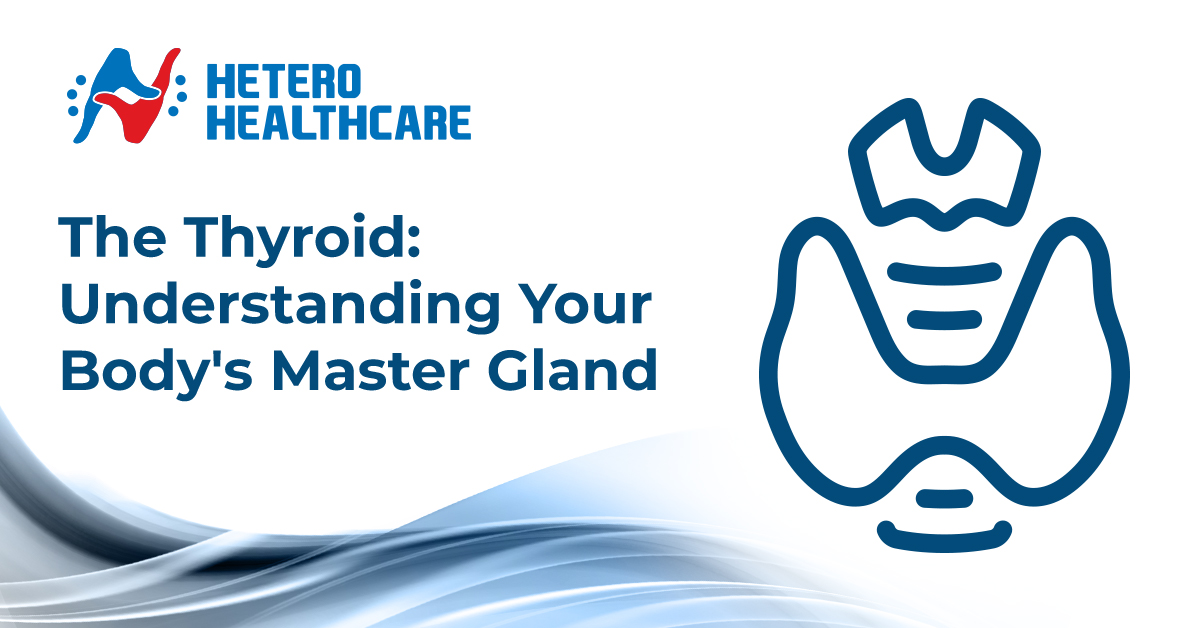The thyroid gland
,
a small butterfly-shaped gland located at the base of your neck, plays a critical role in regulating your
metabolism.
It produces hormones that influence various bodily functions, from energy levels and mood to heart rate and
digestion.
When your
thyroid function
goes awry, it can have a ripple effect on your entire well-being.
This blog delves into the world of the thyroid, exploring different thyroid disorders, their symptoms, diagnosis, and
treatment options. By understanding your thyroid, you can empower yourself to take charge of your health and live a
balanced life.
The Mighty Thyroid: Function and Importance
The thyroid gland produces two main hormones:
triiodothyronine
(T3) and
thyroxine
(T4). These hormones act like chemical messengers, traveling throughout your bloodstream and signaling various
organs and tissues to perform specific functions.
Here's a glimpse into how thyroid hormones influence your body
- Metabolism:Thyroid hormones regulate your metabolic rate, which determines how efficiently your
body burns calories for energy.
- Growth and Development: These hormones are crucial for growth and development, especially in
children and adolescents.
- Brain Function:Thyroid hormones play a vital role in brain development and cognitive function.
- Heart Rate and Blood Pressure:Thyroid hormones influence heart rate and blood pressure.
- Body Temperature: They help regulate your body temperature.
- Mood and Energy Levels:Thyroid function can significantly impact your mood and energy levels.
Thyroid Disorders Explained: An Imbalance in the System
When the thyroid gland produces too much or too little hormones, it disrupts the delicate balance in your body,
leading to various thyroid disorders. Here are the two most common types
- Hyperthyroidism:
When the
thyroid gland produces
an excess of hormones, it leads to a state of hyperthyroidism. This can cause a range of symptoms, including
- Unexplained weight loss
- Increased heart rate and palpitations
- Anxiety and irritability
- Tremors
- Difficulty sleeping
- Increased sweating
- Diarrhea
- Changes in appetite
- Hypothyroidism:
In hypothyroidism, the thyroid gland doesn't produce enough hormones. This can lead to symptoms like
- Unexplained weight gain
- Fatigue and lack of energy
- Feeling cold even in warm temperatures
- Dry skin and hair
- Constipation
- Muscle weakness
- Depression
- Irregular menstrual periods
Causes of Thyroid Disorders
Several factors can contribute to thyroid disorders, including
- Autoimmune disease:In some cases, the body's immune system mistakenly attacks the thyroid
gland, leading to autoimmune diseases like Hashimoto's thyroiditis (
hypothyroidism) and Graves' disease (hyperthyroidism).
- Iodine deficiency:Iodine is essential for thyroid hormone production. Severe iodine deficiency
can lead to hypothyroidism, particularly in
pregnant women.
- Thyroiditis:This is inflammation of the thyroid gland, which can disrupt hormone production. It
can be caused by a viral infection or autoimmune processes.
- Medications: Certain medications can interfere with thyroid function.
- Genetic factors: A family history of thyroid disorders increases your risk.
Diagnosis and Treatment of Thyroid Disorders
Early diagnosis and treatment are crucial for managing thyroid disorders effectively. Here's what to expect
- Blood tests: A simple blood test can measure your thyroid hormone levels (T3, T4, and TSH) to
assess thyroid function.
- Imaging tests: In some cases, your doctor may recommend imaging tests like ultrasound or
radioactive iodine uptake scan to examine the thyroid gland further.
- Treatment:
The treatment for thyroid disorders depends on the specific condition and severity. Here's a brief overview
- Hyperthyroidism: Treatment often involves medications to reduce hormone production or
radioactive iodine therapy to destroy some thyroid tissue. In severe cases, surgery may be necessary to
remove part or all of the thyroid gland.
- Hypothyroidism: The mainstay of treatment for hypothyroidism is synthetic thyroid
hormone replacement medication. This medication needs to be taken daily for life to maintain normal
hormone levels.
Living Well with a Thyroid Condition
If you're diagnosed with a thyroid disorder, don't despair. With proper treatment and lifestyle modifications, you
can manage your condition effectively and live a full, healthy life. Here are some tips
- Medication adherence: Taking your medication exactly as prescribed by your doctor is crucial
for managing your thyroid function.
- Regular follow-up appointments:Maintain regular check-ups with your doctor to monitor your
thyroid hormone levels and adjust your medication dosage as needed.
Healthy diet: A balanced and nutritious diet that includes sufficient iodine is essential for
thyroid health. Here are some tips
- Iodine-rich foods:
Incorporate iodine-rich foods like seafood (fish, shrimp, seaweed), dairy products (milk, yogurt, cheese), and
iodized salt into your diet.
- Limit processed foods:
Processed foods often contain high amounts of sodium and unhealthy fats, which can interfere with thyroid
function. Opt for whole, unprocessed foods whenever possible.
- Fruits and vegetablesAim for a colorful variety of fruits and vegetables to ensure you're
getting essential vitamins and minerals that support overall health.
- Gluten:Some studies suggest a potential link between gluten sensitivity and autoimmune thyroid
disorders like Hashimoto's thyroiditis. If you have concerns, discuss gluten sensitivity with your doctor.
Exercise: Regular physical activity is crucial for overall health and well-being, and it can also
benefit those with thyroid conditions.
- Choose activities you enjoy: Find activities you find enjoyable, such as walking, swimming,
biking, or yoga. Aim for at least 30 minutes of moderate-intensity exercise most days of the week.
- Listen to your body:Start slowly and gradually increase the intensity and duration of your
workouts as your fitness level improves. Pay attention to your body and avoid overexertion, especially if you
have hypothyroidism.
Stress Management: Chronic stress can exacerbate both hyperthyroidism and hypothyroidism symptoms.
Here are some relaxation techniques that can help
- Yoga and meditation: Mind-body practices like yoga and meditation can effectively reduce stress
and promote relaxation.
- Deep breathing exercises:Simple deep breathing exercises can help calm the nervous system and
manage stress levels.
- Getting enough sleep: Aim for 7-8 hours of quality sleep each night. Adequate sleep promotes
overall well-being and can help manage stress.
Importance of Sleep: As mentioned above, getting enough quality sleep is vital for managing a
thyroid condition and overall health. Here are some additional tips for restful sleep
- Establish a regular sleep schedule: • Go to bed and wake up at the same time each day, even on
weekends, to regulate your body's natural sleep-wake cycle.
- Create a relaxing bedtime routine:Wind down before bed with calming activities like reading,
taking a warm bath, or listening to soothing music.
- Optimize your sleep environment: : Ensure your bedroom is cool, dark, and quiet. Invest in
blackout curtains, earplugs, or a white noise machine if necessary.
- Limit screen time before bed:The blue light emitted from electronic devices can disrupt sleep
patterns. Avoid screens for at least an hour before bedtime.
Additional Tips for Managing Your Thyroid Condition
- Join a support group: Connecting with others who understand the challenges of living with a
thyroid disorder can be helpful and provide valuable support.
- Educate yourself:Stay informed about your thyroid condition by reading reliable sources and
attending educational events organized by patient advocacy groups.
- Advocate for yourself: Don't hesitate to ask questions and express concerns to your doctor.
Work collaboratively with your healthcare team to develop a treatment plan that aligns with your individual
needs and preferences.
Conclusion
The thyroid gland plays a vital role in regulating various bodily functions. With proper understanding, early
diagnosis, and effective management strategies, you can live a healthy and fulfilling life even with a thyroid
condition. Remember, consistency with medication, a balanced diet, regular exercise, stress management techniques,
and quality sleep are key to maintaining optimal thyroid health. By taking control of your health and following
these tips, you can live well with your thyroid condition.




